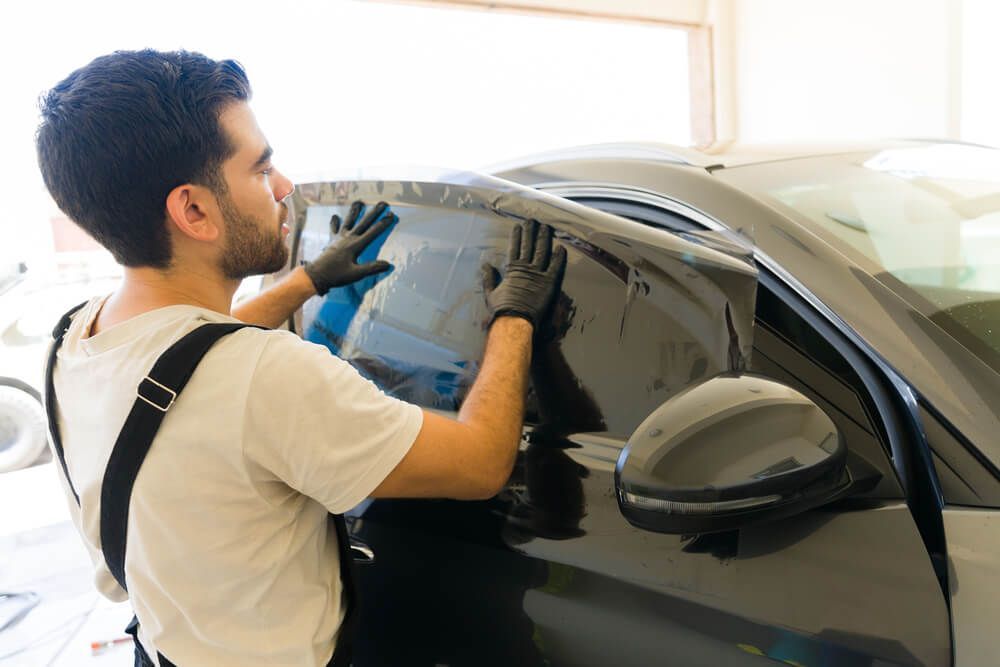Guide To Arizona Tint Laws
Recent Blog Posts
Guide To Arizona Tint Laws
If you are a driver in the state of Arizona, it is important to know if the tint of your windows is in compliance with Arizona tint laws. Though tinting your windows can offer benefits such as reduced glare and heat inside your car, there can be legal limitations and safety issues. Violations of Arizona window tint laws can result in fines or other penalties. Here is a guide to help you understand Arizona window tint laws.
What is the Darkest Tint Legal in Arizona?

In Arizona, the darkness of tint is measured by Visible Light Transmission percentage (VLT%). This percentage refers to the amount of visible light that can pass through the window film and glass. Below is an overview of VLT percentage requirements in Arizona.
Front Side Windows
For front side windows, Arizona law requires a minimum VLT of 33%. This means that at least 33% of outside light must be able to pass through the window.
Back Side Windows
The rules for back side windows are more lenient. Arizona law allows any darkness of tint on the back side windows. This gives vehicle owners more flexibility in choosing their preferred level of tint.
Rear Window
Similar to the back side windows, there are no restrictions on the VLT% for the rear window in Arizona. Vehicle owners can apply any level of darkness they prefer.
Windshield
Tinting on the windshield is restricted to the top portion. Arizona law allows a non-reflective tint on the top of the windshield above the manufacturer's AS-1 line or the top 5 inches of the windshield, whichever comes first.
Reflectivity
In addition to VLT%, Arizona law also regulates the reflectivity of window tint. The front and back side windows cannot be more than 35% reflective. This helps to prevent excessively reflective windows that could impair other drivers' vision.
Medical Exemptions for Tinting
If your medical conditions require you to have your car windows tinted darker than what is normally permitted by Arizona law, you can complete the Application for Window Tint Medical Exemption. Your application will need to be certified by a medical provider. With an approved medical exemption, you will be able to tint your windows darker than what is normally allowed.
Penalties for Non-Compliance
Failing to comply with Arizona tint laws can result in penalties. Here's what you need to know:
Fines
If your vehicle is found to have illegally tinted windows, you may be issued a citation and required to pay a fine. The fine can vary depending on the severity of the violation.
Fix-It Tickets
In some cases, law enforcement may issue a ticket for minor tint violations. This requires you to correct the tint to comply with the legal standards and provide proof of the correction to the authorities.
Repeat Offenses
Repeated violations of tint laws can result in increased fines and potentially more severe penalties. It's important to ensure your vehicle's tint remains within legal limits to avoid repeated issues.
Benefits of Legal Window Tinting
Adhering to Arizona's tint laws offers several benefits:
- Avoiding Fines: Staying within legal limits helps you avoid fines and penalties.
- Improved Safety: Legal tints ensure you have sufficient visibility while driving.
- Resale Value: Keeping your tint legal can positively impact the resale value of your vehicle.
- Reduced Heat and Glare: Even within legal limits, tinting can significantly reduce the heat and glare inside your car.
How to Choose the Right Tint

When selecting window tint for your vehicle, consider the following factors:
- Legal Limits: Ensure the tint complies with Arizona's requirements.
- Quality: Choose high-quality tints that offer UV protection and durability.
- Professional Installation: Have your tint installed by a professional to ensure it meets legal standards and is applied correctly.
Common Myths About Window Tinting
There are several misconceptions about window tinting that can lead to confusion. Here are some common myths:
Myth: Darker Tint is Always Better
While darker tint may offer more privacy, it's not always better. Excessively dark tints can reduce visibility and may be illegal. It's important to find a balance between privacy, visibility and legal compliance.
Myth: Factory Tint is Enough
Factory tint typically offers minimal protection against heat and UV rays. Additional aftermarket tinting may be necessary to achieve desired levels of comfort and protection.
Myth: Tinting Will Damage Windows
When professionally installed, window tinting should not damage your vehicle's windows. High-quality tints are designed to adhere without causing harm to the glass.
Myth: Tint is Permanent
Window tint is not permanent and can be removed if necessary. Professional tint removal services can safely take off the tint without damaging the windows.
Myth: Tinting Only Affects Aesthetics
Beyond aesthetics, tinting offers practical benefits such as UV protection, heat reduction and glare reduction. These functional advantages make tinting a worthwhile investment.
Let Us Help You
Tinted windows offer an array of benefits, such as reduced glare and heat inside your car. Despite the advantages of tinted windows, windows that are tinted too dark can present safety concerns and violate Arizona's window tint laws.
Understanding and complying with Arizona's tint laws ensures that you can enjoy the benefits of window tinting without breaking the law. By staying informed and adhering to the regulations, you can enhance your driving experience while maintaining safety and staying in compliance with Arizona's window tint laws.
If you have questions about Arizona's tint laws or need assistance with a legal issue related to window tinting, the Phoenix personal injury lawyers at Sargon Law Group is here to help you. We understand the importance of complying with local regulations and are dedicated to providing the guidance you need. Contact us today to schedule a consultation and learn more about how our Phoenix, AZ car accident lawyers can help you.





